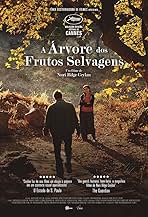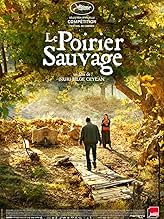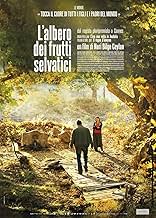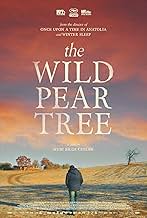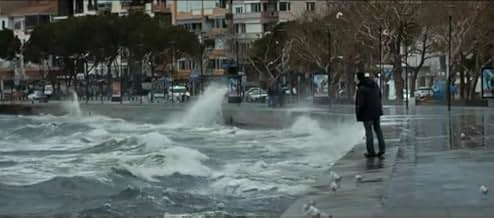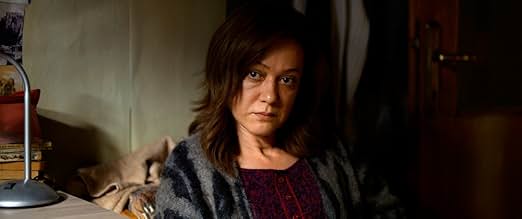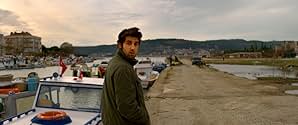PUNTUACIÓN EN IMDb
8,0/10
30 mil
TU PUNTUACIÓN
Un aspirante a escritor vuelve a su pueblo natal donde las deudas de su padre le encuentran.Un aspirante a escritor vuelve a su pueblo natal donde las deudas de su padre le encuentran.Un aspirante a escritor vuelve a su pueblo natal donde las deudas de su padre le encuentran.
- Dirección
- Guión
- Reparto principal
- Premios
- 10 premios y 15 nominaciones en total
Dogu Demirkol
- Sinan Karasu
- (as Aydin Doğu Demirkol)
Reyhan Asena Keskinci
- Yasemin Karasu
- (as Asena Keskinci)
Reseñas destacadas
The wind rises as Sinan and Hatice kiss at a spring on the outskirts of the forest. It is the threshold of many things, not merely the forest. A few steps in the right direction will lead to love and the fulfillment of dreams. The wrong steps invite heartbreak and the crushing weight of societal expectations. Which way to go?! While Sinan inspires Hatice to let her hair down, a big step in Turkey, he can't seem to help himself. The gambling addiction, fawning desire to please and wild schemes of his father are not where Sinan wants to go, yet understanding his father is the key to understanding himself, for better or worse. Wild pears are isolated misfits, and so are father and son.
This witty and beautiful film is full of metaphors, wonderful imagery and deep, intriguing conversations. The film revolves around many interesting themes. Among these themes is that ruptures in the soul should be treated with joy and patience for they help us discover who we are. The cinematography is luminous, mesmerizing and far ranging from lamp lit streets at night, rainfall and close-ups of Hatice's flowing hair. I want to linger in each place. It is a long film, but for what it reveals about contemporary Turkish society and human nature, it is a fantastic bargain and worth the price. From the director of Winter Sleep and Once Upon a Time in Anatolia. Seen at the 2018 Toronto International Film Festival.
This witty and beautiful film is full of metaphors, wonderful imagery and deep, intriguing conversations. The film revolves around many interesting themes. Among these themes is that ruptures in the soul should be treated with joy and patience for they help us discover who we are. The cinematography is luminous, mesmerizing and far ranging from lamp lit streets at night, rainfall and close-ups of Hatice's flowing hair. I want to linger in each place. It is a long film, but for what it reveals about contemporary Turkish society and human nature, it is a fantastic bargain and worth the price. From the director of Winter Sleep and Once Upon a Time in Anatolia. Seen at the 2018 Toronto International Film Festival.
It has been 21 years since Ceylan shot his first feature film Kasaba, whose main theme was an intellectual young man's desperate, family-stuck life in the countryside with no way out. After this film throughout his film career he focused on different themes as well of course, from middle class criticism (Climates) to film noir (Three Monkeys). But, being from Turkey, eventually in his last movies he returned to the countryside tales again. Especially this movie, The Wild Pear Tree, seemed to me as if Ceylan suffered from a partial amnesia and forgot that he shot the movie Kasaba. So he blended this "brand new film idea" with his recently developed film aesthetics and here we have The Wild Pear Tree.
In his first movies Ceylan barely had a story, he only had "themes". The rest of the movie was wonderful photography and this is what he got famous for. Then, founding clever collaborations, he learnt how to tell stories as well. But the question here is: does he really have a new story to tell? Turkey has changed a lot since Kasaba, but Ceylan's representations look like they are here to stay eternally. For instance, while Ceylan still hold on to the "intellectual stuck in the countryside" stereotype, intellectuals in the Turkish countryside either made it to the metropolises or they are replaced/outdated by the emerging religious elite.
So instead of telling a new story, Ceylan seems like he chose to "garnish" what he already has, with neverending dialogues unattached to each other. Dialogue with the girl, dialogue with the mayor, with the businessman, with the writer, with the police friend, with the imams and with this and this and this. Kind of a video game, one "countryside monster" at a time. So I think this movie is a rococo remake of minimalist Kasaba.
So if you tolerate the theatrical lines in the first dialogues, the movie is a nice one to see. But in comparison to the last 2 movies of Ceylan, this is certainly a step backwards (and surprisingly, this backwardness is evident also in the photography).
In his first movies Ceylan barely had a story, he only had "themes". The rest of the movie was wonderful photography and this is what he got famous for. Then, founding clever collaborations, he learnt how to tell stories as well. But the question here is: does he really have a new story to tell? Turkey has changed a lot since Kasaba, but Ceylan's representations look like they are here to stay eternally. For instance, while Ceylan still hold on to the "intellectual stuck in the countryside" stereotype, intellectuals in the Turkish countryside either made it to the metropolises or they are replaced/outdated by the emerging religious elite.
So instead of telling a new story, Ceylan seems like he chose to "garnish" what he already has, with neverending dialogues unattached to each other. Dialogue with the girl, dialogue with the mayor, with the businessman, with the writer, with the police friend, with the imams and with this and this and this. Kind of a video game, one "countryside monster" at a time. So I think this movie is a rococo remake of minimalist Kasaba.
So if you tolerate the theatrical lines in the first dialogues, the movie is a nice one to see. But in comparison to the last 2 movies of Ceylan, this is certainly a step backwards (and surprisingly, this backwardness is evident also in the photography).
The film depicted a cliche plot of life that happen everywhere in the world that nobody in hollywood would ever produce. it's a loser story, something that might not be "inspiring", "uplifting", and just plain depressing and plays at key minor at an instrument (even tho there's some note changes at the end). it's a taboo song that people often treat as a myth. it's like discovering Bicycle Thieves and Mouchette once again.
The Wild Pear Tree is Nuri Ceylan's most recent long, compelling character study of a newly graduated student struggling to publish his supposedly unique book about life living in Canakkale. The movie can be said to be the sum of Sinan's interactions with various people throughout the film, including his father who has a gambling addiction, his mother and sister who don't seem overly supportive of him, his apparent love interest, various publishers, religious imams and public figures, and of course other famous writers. The move is very dialogue driven, but it is also not at the same time, given its long runtime, there are also many scenes of simple quietness, and mere great cinematography. However, at times, it feels as though Ceylan has dragged it too far. He appears to have gotten too comfortable in the Director's seat and it feels as though some dialogue scenes and some scenes showcasing amazing cinematography are too long. The plot, or at least the main background story following the move along, also does not feel as compelling as his previous film Winter Sleep. Overall, the movie is great, but also tends to drag a bit. In his previous film Winter Sleep, I think Ceylan got the balance right for achieving the classification 'masterpiece.' However, in the Wild Pear Tree, it is merely a good movie with its flaws, and the main flaw anyone will feel coming out of the film is some of the unnecessary runtime.
The main character has a very rich and interesting personality, as well as the other characters that surround him. The cinematography is amazing as usual but some of the weird things that happen during the moving shots make them far less impressive than the glorious still shots.
It's very easy to find things from your own life within the story and the dialogues that occur which makes a lot of the little-longer-than-usual scenes very engaging and that makes you wonder how the dialogue is gonna develop and conclude.
I normally don't care too much about the length of movies but I'm a little bit on the negative side with this one. That's mainly because of what I told myself halfway through the movie which was; "Ohhh, we're only halfway" instead of "Yeahhh, we're only halfway".
It's about a young writer who recently finished university. He must move back to his village from the city where he went to school. So his struggles start as he doesn't want to get used to the village life.
It's very easy to find things from your own life within the story and the dialogues that occur which makes a lot of the little-longer-than-usual scenes very engaging and that makes you wonder how the dialogue is gonna develop and conclude.
I normally don't care too much about the length of movies but I'm a little bit on the negative side with this one. That's mainly because of what I told myself halfway through the movie which was; "Ohhh, we're only halfway" instead of "Yeahhh, we're only halfway".
It's about a young writer who recently finished university. He must move back to his village from the city where he went to school. So his struggles start as he doesn't want to get used to the village life.
¿Sabías que...?
- CuriosidadesAccording to Nuri Bilge Ceylan, The Wild Pear Tree is about a son's unavoidable slide towards a fate resembling that of his father.
- Citas
Sinan Karasu: When we learn we are not so important why is our instinct to be hurt? Wouldn't it be better to treat it as a key moment of insight? We engender our own beliefs. Thus we need to believe in separation as much as in beauty and love, and to be prepared. Because rupture and separation in wait for everything beautiful. In which case, why not treat these tribulations as constructive disasters that help us pierce our own mysteries.
- ConexionesFeatures Umutsuzlar (1971)
- Banda sonoraPassacaglia and Fugue in C minor, BWV 582
Composed by Johann Sebastian Bach
Performed by Leopold Stokowski
Selecciones populares
Inicia sesión para calificar y añadir a tu lista para recibir recomendaciones personalizadas
- How long is The Wild Pear Tree?Con tecnología de Alexa
Detalles
- Fecha de lanzamiento
- Países de origen
- Sitios oficiales
- Idioma
- Títulos en diferentes países
- The Wild Pear Tree
- Localizaciones del rodaje
- Yenice, Çanakkale, Turquía(location)
- Empresas productoras
- Ver más compañías en los créditos en IMDbPro
Taquilla
- Recaudación en Estados Unidos y Canadá
- 34.014 US$
- Fin de semana de estreno en EE. UU. y Canadá
- 4923 US$
- 3 feb 2019
- Recaudación en todo el mundo
- 1.696.258 US$
- Duración3 horas 8 minutos
- Color
- Mezcla de sonido
- Relación de aspecto
- 2.39 : 1
Contribuir a esta página
Sugerir un cambio o añadir el contenido que falta

Principal laguna de datos
By what name was El peral salvaje (2018) officially released in India in English?
Responde

